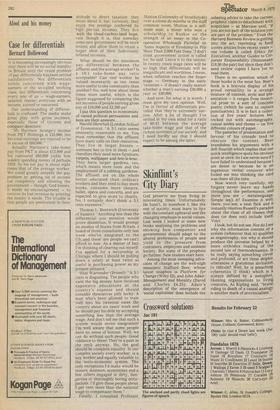Skinflint's 'City Diary
God preserve me from living in interesting times. Unfortunately He hasn't, so somehow I, like the rest of society, must learn to live with the constant upheaval and the changing emphasis in social values. Last week I looked at some new books analysing the problems and showing how companies and governments should adapt to the altered preferences of people and yield to the pressure from customers, employees and ambient 'society. But some of the prophets go further. New readers start here.
Among the most sweeping advocates of change are the well-nigh messianic Stafford Beer, whose latest soapbox is Platform for Change (Wiley £5), and John Adair: Management and Morality (David and Charles £4.25). Adair's description of the emergence of 'social capitalism' does include the opeuGaZOT March 8, 1975 sobering advice to take the current prophets' claim to detachment with scepticism — as Marcuse said, "if you are not part of the solution you are part of the problem." Even the Harvard Business Review is getting into the act, reprinting in hard covers articles from recent years — one volume is called Ethics for Executives, another Guides to Corporate Responsibility (Heinemann £10.50 the pair) but since they don't send review copies I have yet to read them.
There is no question which of these books is the most fun. Beer's book is a bravura display of his proud versatility in a strange mixture of content, style and presentation — it ranges from theatrical prose to a sort of concrete poetry (which he uses to replace punctuation). It is in fact a collection of five years' lectures but tricked out with autobiographY, casual asides and theses — on five different colours of paper. The panache of presentation and fervour of his crusade tend to obscure the content. Beer brandishes his arguments with a deft flourish which implies that our quick intelligence spots his obvious point at once. So I am never sure if I have failed to understand because I am dense or because he is an ingenious verbal conjuror who fooled me into thinking the card was there all the time.
Now watch very carefully, my fingers never leave my hands throughout the performance, and there you are — metalanguageSimple isn't it? Examine it well; there, you see, a neat flick and it instantly resolves Russell's paradox about the class of all classes that does (or does not) include itself. Vole/.
I look, but do not see. Nor do I see why the information content of a system (whatever that is) qualifies as negentrophy, nor why it should produce the universe helped by a more orthodox reading of the second laW of thermodynamics. Is he really saying something clever and profound, or are these delphic utterances a gratuitous invitation to ridicule? Well, he is preaching 'cybernetics (I think) which is a science defined by a metaphor, likening organisations to living creatures. As Kipling said, "brutal riding to death of a casual analogy is another mark of provincialism.'










































 Previous page
Previous page